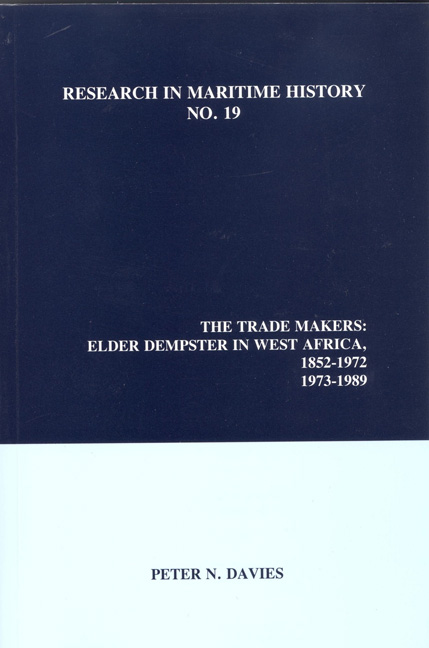Book contents
- Frontmatter
- Table of Contents
- List of Illustrations
- Foreword
- Introduction (Second Edition)
- Foreword
- Preface
- Acknowledgments
- Introduction to the Original Edition
- Frontispiece
- Part One The Pioneers
- Part Two Elder Dempster And Company
- Part Three Elder Dempster And Company Limited
- Part Four Elder Demster Lines Limited
- 11 The Reorganisation of the Company
- 12 The Second World War
- 13 Post-War Reconstruction
- 14 Recent Developments
- 15 The Future
- Part Five The End Of An Era
- List of Appendices
- Appendices
- Bibliography
- Index
11 - The Reorganisation of the Company
from Part Four - Elder Demster Lines Limited
- Frontmatter
- Table of Contents
- List of Illustrations
- Foreword
- Introduction (Second Edition)
- Foreword
- Preface
- Acknowledgments
- Introduction to the Original Edition
- Frontispiece
- Part One The Pioneers
- Part Two Elder Dempster And Company
- Part Three Elder Dempster And Company Limited
- Part Four Elder Demster Lines Limited
- 11 The Reorganisation of the Company
- 12 The Second World War
- 13 Post-War Reconstruction
- 14 Recent Developments
- 15 The Future
- Part Five The End Of An Era
- List of Appendices
- Appendices
- Bibliography
- Index
Summary
The Establishment of Elder Dempster Lines Limited
The collapse of the Royal Mail Group left its voting trustees with the task of maintaining its various companies as going concerns until such time as they could be sold. The depth of the depression in trade made any question of the realisation of assets quite pointless, so it was decided that the best solution was to create a number of new, independent companies to acquire the assets of the old. Shares in the new firms could then be distributed on a pro rata basis so as to provide some compensation for the creditors and debenture holders. These, of course, took precedence over the ordinary and preference shareholders who could expect no return before all other accounts in their respective companies were settled. In fact, as the table on page 230 shows, so much capital was lost that the ordinary and preference shareholders received nothing. The only exception to this was in the case of the Union Castle Mail Steam Ship Company Limited, for as it had issued no debentures its cumulative preference shareholders were able to take control, and ultimately they restored the Company to independence and prosperity without the loss of any capital.
The scheme of reorganisation proposed by the voting trustees was effective from 1 January 1932, although it was not finally approved by the debenture stockholders and sanctioned by the High Court until later in 1932. Under the terms of the reconstruction agreement, two new firms were to be formed to continue existing services. These were the Royal Mail Lines Company and the West African Lines Company, and it is the second of these with which we are now concerned. To all intents and purposes this was made up of the West African interests of Elder Dempster and its associates.
Richard (later Sir Richard) Durning Holt, a partner in Alfred Holt and Company, then began an active association with the West African shipping trade for he was:
invited by the Governor of the Bank of England on behalf of the Governments of Great Britain and Northern Ireland to undertake the chairmanship of the Elder Dempster branch of the Royal Mail combinations.
- Type
- Chapter
- Information
- The Trade MakersElder Dempster in West Africa, pp. 229 - 254Publisher: Liverpool University PressPrint publication year: 2000

